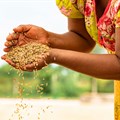Africa faces a severe food waste crisis, losing about a third of its agricultural produce annually. In South Africa alone, 30% of the 31 million tonnes of food produced each year never reaches consumers, resulting in losses of R61.5 billion, or 2.1% of GDP.
Sub-Saharan Africa leads globally in post-harvest losses, with grains accounting for 37% of losses—worth $4bn—and fruits and vegetables experiencing spoilage rates of up to 50%. This high level of waste threatens food security across the continent, highlighting the urgent need for intervention.

Source: Supplied
Identifying key points of loss
"Considerable attention is given to increasing food production, but there’s less focus on reducing food loss and waste so more people could be fed using the same resources. Identifying the key points in the value chain where these losses occur is essential for crafting effective interventions," says Ben Leyka, CEO of the African Agri Council.
Food security is not uniformly distributed across South Africa, with rural areas experiencing higher levels of food insecurity than urban centres.
“Public-private sector collaboration in food distribution is inefficient and, in many cases, it's impossible for the private sector to alone tackle food distribution in rural areas and underserved communities,” says Susan Payne, CEO at Holistic Agricultural Investments Group, who believes there are multiple ways governments can get involved and help to take responsibility for their citizens. These include cutting red tape, providing incentives and supporting input schemes to support rural farmers to grow base crops.
Local partnerships and food distribution
Payne says that in Zambia, the organisation’s commercial farm works with local input providers to grow large crops and distribute food like wheat, maize seed, and potatoes across the country to both rural and urban communities. These partnerships are vital to the production of food at scale, directly benefiting the populations of the countries in which they are founded.
"We can’t ignore regions where over half of households report moderate to severe food insecurity," says Leyka. “The fight against food waste requires a multifaceted approach. By investing in proper storage and transportation facilities, we can cut losses by up to 50%. This will enhance food security and contribute to a more sustainable future for Africa."
Addressing global food insecurity
To begin to properly tackle global food insecurity, Payne says it's crucial to unearth and support innovations that can scale and support these through grants and other funding.
"We need partnerships between the innovators and governments that function well, from providing (or dispensing with) visas easily to moving money across borders freely to receiving tax breaks to creating tax-free economic zones," she says.
"We also need better, more vocal, leadership in this space in Africa, with more coordinated efforts between all parties,” she says, equating the goal to an orchestra playing in harmony, while currently all the parties are still tuning their instruments.
According to the UN’s Food and Agricultural Organization, approximately 13% of food production is lost between harvest and retail, while an estimated 17% of total global food production is wasted in households, food service and retail combined.
“Innovative technology provides the booster for the rockets addressing food waste. Without this, we’ll struggle with tackling the various aspects of, and solutions to, food waste, for humans, animals and as mulch” says Payne. “With at least 20% of food wasted today, equating to 1 billion meals, and with 60% of that from households, there is huge scope for improvement.”
The African Agri Investment Indaba (AAII), hosted by the African Agri Council, is set to be a crucial platform addressing the pressing issue of food insecurity, particularly in the context of Africa Day for Food and Nutrition Security which will be observed on 31 October 2024. This year's AAII theme underscores the urgent need to combat food wastage as part of the mission to achieve Zero Hunger by 2030.
The Indaba aims to shine a spotlight on the inefficiencies within agricultural practices and supply chain management that contribute to this waste, particularly the inadequate storage and transportation infrastructure that plague rural areas.
Mobilising for a sustainable food future
“This event is not merely about discussion; it’s about mobilising resources and partnerships to implement actionable solutions,” says Leyka. “As Africa’s population is projected to reach 1.7 billion by 2030, tackling food waste is not just an immediate concern; it is vital for ensuring long-term food security. We must prioritise investments in education and technology that empower farmers to reduce losses at every stage of the supply chain.”
The African Agri Investment Indaba will convene over 800 industry leaders, policymakers, and innovators, serving as a platform to share insights and develop transformative strategies that can reshape agricultural practices across the continent.
It will explore collaborative strategies that unite government and private sectors in addressing food waste. By creating circular food systems and enhancing infrastructure, stakeholders can significantly reduce food loss and improve accessibility for vulnerable populations.
“The fight against food insecurity transcends agriculture; it is a collective moral responsibility. By fostering collaboration, embracing innovation, and prioritising education, we can turn the aspiration for food security into a reality for all," says Leyka. "The African Agri Investment Indaba stands as a critical step in this journey, bringing together stakeholders committed to making a meaningful difference."
































